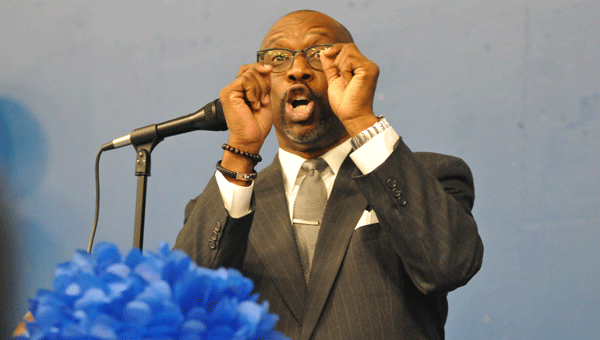Annual MLK Freedom Breakfast hosts hundreds
Published 6:27 pm Tuesday, January 17, 2017

Keynote speaker L. Kirk Hatcher appealed to youth and older audiences alike with a rousing message of living up to one’s full potential.
A mosaic of faces from all walks of life comprised the scene at Dunbar Community Center Monday morning during the Butler County Civic League’s annual Martin Luther King Jr. Freedom Breakfast.
A number of dignitaries from Butler County and beyond spoke to a crowd of hundreds during the decades-long tradition celebrating not only the life, but also the ongoing dream, of Dr. King.
Included among said dignitaries were Greenville and Georgiana mayors Dexter McLendon and Jerome Antone, who both expressed thanks for yet another invitation to such an important occasion.
“Today, we’re here to honor a great American,” McLendon said. “I’m honored to be a part of it. But more than anything else, we want you to know that its an honor to serve you and to be a part of Greenville, Ala.
“I love Greenville, and I believe our plans for 2017 are going to be great. I believe we’re going to have a few more things happen, one in particular that if it comes about will probably be as big as anything that’s ever happened in Greenville. Again, that’s still a dream; it takes time and energy to do these kinds of things, but we’ll continue to work on it.”
Mayor Antone introduced his new police chief, Carlton Cook, while also looking forward to the challenges ahead, noting that Dr. King’s work is nowhere near done.
“If Martin Luther King was here, what would he say? He would say ‘we could do better,’” Antone said. “So I challenge you to make today a better day, and make the next day better than the day before. And if we can come together and do those two things, it would be amazing what we could do.
We’re going to have to hold hands and stand together. If we can’t do that, we’ll go right back to 50 years ago. Let’s continue to push forward and make future days a better day for everybody.”
Butler County commissioner Frank Hickman also spoke on behalf of the remaining commission members in attendance, and he noted Dr. King’s command over words and how those words elevated his influence.
“Dr. King was a positive influence in shaping America, and the world, for the better,” Hickman said. “He was a difference maker, and his life mattered. His vision was the complete liberation of mankind, and the elimination of social injustices.
“Dr. King accomplished much of his vision and his goals during his lifetime, and he did it with a combination of powerful and beautiful words. Dr. King had a radiant vision of hope for what America could be despite what it was.
“Dr. King was a wordsmith, and words do matter. Dr. King’s speeches were transformative, and they showed that the power of one man and the magic of his word could change history.”
Annie Ruth Davis delivered an explosive poem that vividly recalled imagery of colored water fountains, marching and enduring waves of tear gas and other forms of oppression in the hot suns of the tumultous 1960s.
“It knocked us down, it knocked us down, it knocked us down!” Davis screamed.
But we got up.
“Let us march forward, black and white together. We have built a great nation, and united we must stand. Let us educate our minds, and give thanks. For we have come too far, and we ain’t going back.”
Keynote speaker L. Kirk Hatcher began by remarking on the importance of seeing young people in attendance Monday morning, and his first words–quoting educator Benjamin E. Mays–proved perhaps most pertinent to them.
“The tragedy in life doesn’t lie in not reaching your goal. The tragedy lies in having no goal to reach,” Hatcher said.
“It isn’t a calamity to die with dreams unfulfilled, but it is a calamity not to dream. It is not a disaster to be unable to capture your ideal. But it is a disaster to have no ideal to capture. It is not a disgrace not to reach the stars. But it is a disgrace to have no stars to reach.
“Not failure, but low aim, is sin.”
Hatcher spoke of the issues that King attempted to address that went well beyond race relations, including issues regarding what it means to be civilized in the political and social world.
“Leaders, if you will, particularly those who have showcased themselves during this last presidential campaign who shamelessly employed tactics to unearth the absolute worst among this American election,” Hatcher said. “Yes, I said it.
“Rife with political and religious incongruity designed to inflict maximum pain on those yet struggling to claim themselves in this American experience.
“It pays to look closely at whatever masquerades as the hand of God. Because there may be a wart of avarice between the fingers.”
Hatcher added, however, that King’s words and deeds echo hope that this country could become a beacon for its original intended purpose once again.
“I, for one, refuse to believe that this country would have come into existence without the profound and explicable purposes the almighty God intended,” Hatcher said. “We are here to establish before the world that the people can be brought together. They can be brought together for good. I need nobody to tell me what the original intent of this land was. It was that there should be an open democracy with liberty and justice for all.”





